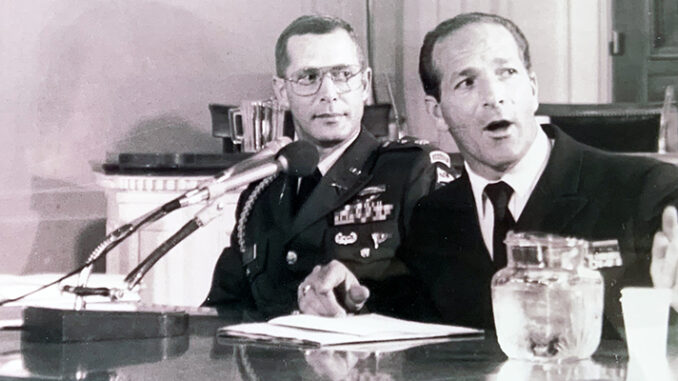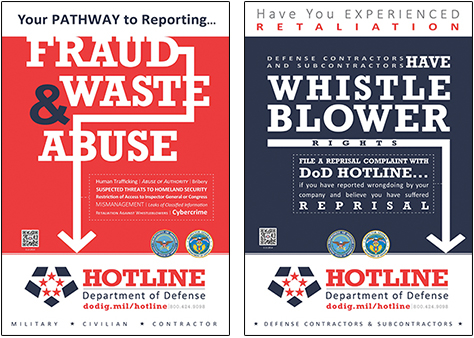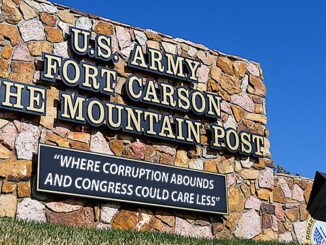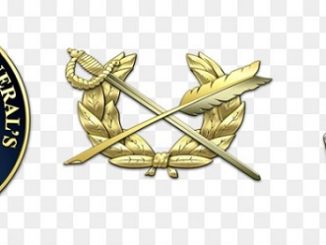
The military sometimes murders whistleblowers, and cloaks the heinous crime by making it look like the so-called distraught individual took his/her own life. The American military is a master at converting a murder to into a suicide.
When murder might be a bit risky, the military prefers to weave a web of administrative and judicial deception designed to remove the whistleblower from active duty in order to fully neutralize the threat of exposing corruption and misconduct.
Before he died, the person who established this website two decades ago was writing a book called “Murder” in the Military. Major Glenn MacDonald skillfully documented all of the stories he became aware of since Vietnam on how the military would frequently label cold-blooded murders as a suicides in order to coverup all manner of misconduct.
In the featured picture above, Major Cole and Chief Tufariello came forward to testify before a Congressional subcommittee about fraud they witnessed. Even though the whistleblowers were sincere, their testimony before Congress was used by the politicians to make it look like Congress was doing something about whistleblower retaliations in the military.
Nothing changed. Massive fraud in the military continues unabated. Nothing will ever change until admirals and generals are thrown in prison just like the whistleblowers wrongfully court martialed, and others administratively destroyed with Other-Than-Honorable discharges. (Ref: Army Major Andrew Higgins)
Fraud in the military and whistleblower retaliation didn’t start in 1988 when Major Cole and Chief Tufariello testified before Congress. The persecution of military whistleblowers probably began since the days of George Washington. The system was designed to protect the system.
The methods the military uses to silence whistleblowers is a dark secret the government never wants to address because it exposes staggering amounts of fraud, waste and abuse thereby undercutting their own integrity with the American people.
Erosion of integrity results in a precipitous decline in power. Politicians covet money and power most of all.
AN ARMY MAJOR AND A NAVY CHIEF
Navy Chief Tufariello bravely came forward to stop massive payroll fraud in the naval reserves. He wasn’t trying to feather his own bed or get even with someone else, he simply wanted the violations of the naval pay manual to end. Little did he know how ingrained the fraud actually was.
Instead of holding the naval officers perpetrating the fraud accountable, the United States Navy took a page from the Russian playbook and threw Chief Michael Tufariello in the mental ward of a military hospital.
It turns out that Russian methods in dealing with problem individuals are not too far from our own. ‘Hey comrade, you are looking a little pale. Are you feeling OK? Seize him and take him to the mental hospital. After that, put him in the gulag. If that doesn’t break him, then just kill him.’
Ironically, Chief Michael Tufariello was chosen as the Navy’s Shore Sailor of the Year only a year before the Navy pulled their shitty little reprisal on him.
Combat medals from Vietnam and accolades from across the globe were not enough to prevent the Navy from ripping him from his family one evening and illegally incarcerating him in a military mental hospital. In the Navy we called that being lower than whale terds.
Army Major Peter Cole discovered $118 million in fraud, probably just the tip of the iceberg. God only knows what happened to him.

WORDS OF WISDOM
If you are on active duty in the United States military, do not blow the whistle on anyone for any reason. Otherwise, your illustrious military career will end up on a trash heap, and you might find yourself in a 8′ x 10′ cell at Ft. Leavenworth. Do not pick up the phone and dial the hotline number, or you will surely regret it.
It’s with a heavy heart we provide you this wise counsel. Don’t think for one minute that anyone will come to your aid, other than perhaps your parents or loved ones.
Believe us when we tell you the military has developed effective strategies to deal with grieving parents and spouses by first grieving with them, then simply ignoring them.
In 1988, Major Peter Cole and Chief Tufariello came forward to give testimony as to what happened to them when they reported criminal misconduct. Their testimony is credited with passing the Military Whistleblower Protection Act.
The the military could care less about the Whistleblower Protection Act. To military commanders, the people who pass these laws are just passing through. But circling the wagons and ignoring the whole issue, they can go right back to what they were doing before.
Decades have gone by since Cole and Tuff attempted to make change. Sadly, nothing has really changed at all. Even though military personnel are allegedly protected under the Act, the military keeps those protections a secret from military personnel.
If an active duty member sees something that is either illegal or unethical, we strongly recommend they NOT SAY OR DO A DAMN THING. We say this because we love you, and because we have file cabinets filled with one whistleblower story after another. Not a damn one of these whistleblower stories had a good outcome.
DON’T CALL THE GOVENMENT, CONTACT US INSTEAD!
Having said all that; if you have credible evidence of corruption in the United States military… send it to us. We will put all your evidence in a safe place until you return back to civilian life. We are prepared to wait decades if necessary in order to protect the whistleblower.
For your own safety, you must completely extricate yourself from the military before revealing what you know. And even then, we strongly recommend that your identity remain concealed.
Let us expose military corruption. Don’t you do it. And, for God’s sake, don’t even think about exposing the corruption while on active duty. The military will never be serious about protecting whistleblowers because it’s simply not in their interest to do so.
In order to correct the problem, they would have to throw several flag-ranking officers in prison, something they find most unpalatable and cannot conceive, no matter what the crimes are.
The admirals and generals view themselves above the law, because they are, in fact, above the law. That’s the truth of it!
The only thing we can do, is expose their criminal misconduct so they are no longer invited to the cocktail parties of the rich and powerful. Being ostracized by their cronies, has a certain amount of distaste for the high and mighty.
Even though it’s hardly considered the type of punishment they deserve, it does have some value. At a minimum, they know that we are always on watch and prepared to fully expose their criminal and ethical misconduct.
1-800 FRAUD, WASTE AND ABUSE
Think back to when Ronald Reagan became president. He allowed his military commanders to set up a 1-800 number for people to report fraud, waste and abuse in the military. It was commonly referred to as the “1-800 Fraud, Waste and Abuse Hotline.” (See the typical poster shown above)
And, who do you think whistleblowers were talking to when they called the hotline number? They were calling the military to report crime and corruption in the military. There’s something always wrong, when the fox is guarding the hen house.
The whole system was set up to FIND AND DESTROY the whistleblowers before they had the chance to go to the lame-stream-media. It was also set up for political reasons, so politicians and flag-ranking officers could thump their chests saying they were taking fraud, waste and abuse seriously.
After decades since establishing the 1-800 Fraud, Waste and Abuse hotline, how many people do you suppose where charged with a violation of the UCMJ? The answer is…. wait for it…. ZERO. No one has ever been held accountable, even though there as been literally billions of dollars in waste and fraud in the military since the hotline was established.
THE CASE OF MAJOR DAN JOHNSON

The military ruins the whistleblowers and reward the thieves. Major Dan Johnson is a classic case.
South Carolina Air Natl. Guard JAG lawyer, Major Dan Johnson was an Army reservist.
When Johnson wasn’t court-martialing military personnel, he was the solicitor (district attorney) of Richland and Kershaw Counties in South Carolina.
Aside from other outrageous behavior, Major Johnson would frequently go on “business” trips with other people’s wives.
When he got back from his little mini-honey-moon trips, he copied his expenditure receipts, sending them to both the military and the county admin office.
In this way he got reimbursed twice, one check from the county and one from the military.
The military knew what Major Johnson was doing, but looked the other way, because everyone wanted to be a friend of the powerful JAG officer and district attorney.
Dan Johnson’s criminal activity rose to $44,000 of fraudulently stolen money, until the U.S. Attorney’s office filed over fifty charges of fraud and misconduct against county solicitor Dan Johnson, but cut him a deal to reduce 50+ charges down to only two.
We don’t know if individuals in the military attempted to blow the whistle on old Danny boy, or not. But, we do know the military rewarded Major Dan Johnson by allowing him to resign with an Honorable Discharge.
That’s the military’s playbook… ruin the whistleblowers and reward the criminals.
TO HIS CREDIT
To his credit, Senator Chuck Grassley introduced the Whistleblower Programs Improvement Act of 2019.
Grassley is at least trying to put some teeth into whistleblower protection, but there is no serious mention of protecting military whistleblowers. That’s because even and United States Senator can’t protect any one in the military from reprisals.
The way Members of Congress (MOC) get the attention of the military is when they withhold money from the military budget.
So, in the off chance the military stomps on a friend or relative of a Member of Congress, they put their next fiscal year’s budget in jeopardy. And, there’s a remote chance the MOC could dial up the President requesting the general or admiral involved be summarily fired.
No Congressperson or Senator can protect a whistleblower when the military has their own little court system and the person who chooses the jury (underlings from his own chain of command) is the same person who brought charges against the accused.
Here is Grassley a few days ago discussing his suggested improvement to whistleblower protection (for the civilians).
LISTEN TO IT…
READ IT…
I recently introduced the Whistleblower Programs Improvement Act of 2019.
This legislation strengthens whistleblower protections for whistleblowers working in a variety of key sectors, including our securities and commodities industries, and the Foreign Service.
There’s been a lot of talk about government whistleblowers lately.
It’s important to remember that many of our whistleblower laws are there to protect average Americans who don’t work in government at all.
Many of the groups helped by this bill work in private industry.
In some cases, they’re investors or businesspeople who have been on the receiving end of financial fraud.
In others, they’re employees – stock brokers, traders, investment advisers, administrative professionals and other support staff – who see activities in the course of their work that they know are wrong and decide to speak out.
Among these brave whistleblowers are people like the three employees at Merrill Lynch who had evidence that between 2009 and 2015, their company was misusing customer cash.
Those whistleblowers told the SEC what they knew, and, in doing so, provided information critical to an investigation of the company’s practices.
That investigation uncovered multiple violations of federal rules.
Among other things, the SEC found the company was not depositing cash in reserve accounts as required.
Instead, it was using tricky accounting maneuvers to free up billions of dollars per week and finance its own trading activities.
And in the process, it was putting its customers’ cash at risk.
The SEC said that, “had Merrill Lynch failed in the midst of these trades, the firm’s customers would have been exposed to a massive shortfall in the reserve account.”
The information provided by whistleblowers led to a successful enforcement action, which involved an admission of wrongdoing by the company and a $415 million dollar settlement.
If the whistleblowers hadn’t stepped forward, then who knows, those shady accounting practices might still be going on today, instead of having been stopped cold.
Investors might still be facing the same unnecessary risks.
There are plenty of examples from the commodities industry as well.
People like Edward Siedle, a whistleblower who informed the CFTC that JP Morgan Chase was failing to disclose conflicts of interest with some of its clients.
Because Mr. Siedle decided to speak out about what he knew, the government collected hundreds of millions of dollars in settlements.
Whistleblowers like Mr. Siedle and the employees at Merrill Lynch deserve our gratitude, and they deserve our support.
They help the SEC and CFTC do their job, and they help to promote transparency and accountability in our financial system.
I’ll tell you something else they deserve.
They deserve assurance that when they put their jobs and their reputations on the line, they won’t be fired just for trying to do the right thing.
They deserve to know that if the government recovers money because of their disclosures, they’ll be able to get a decision on their award application in timely fashion.
Currently, whistleblowers don’t have these assurances.
Last year, despite strong objections that I raised in a brief to the Supreme Court in the case Digital Realty v. Somers, the Court ruled that a whistleblower who reports violations of our nation’s securities laws is protected from retaliation only when he or she discloses wrongdoing directly to the SEC.
Because of this ruling, if a whistleblower in the securities industry reports a concern to a supervisor at their place of work without also going to the SEC, they can be fired without any recourse.
They have no legal protection or means of getting their job back.
That’s not what Congress intended when it created the current SEC whistleblower program in 2010.
It’s not what I intended when I voted for it.
That law was supposed to protect whistleblowers who report wrongdoing.
It was supposed to prevent them from being fired without just cause.
This decision has far-reaching implications that potentially affect others beyond those working in the securities industry.
Because the commodities whistleblower program was established through the same public law as the SEC program, that program incorporates many of the same provisions, including language similar to that which the Supreme Court ruled on during the Digital Realty case.
That means whistleblowers in yet another program face the prospect of having anti-retaliation provisions Congress put in place a decade ago suddenly yanked away from them.
That’s unacceptable to me.
It’s a scenario that should be unacceptable to every member of this body who cares about keeping our financial system strong.
My bill prevents the Supreme Court’s ruling from becoming the status quo.
It makes it clear that whistleblowers who report concerns about possible violations of our federal securities and commodities laws are fully protected, whether they take their concerns to the SEC or CFTC, or to anyone else in their company who they reasonably believe has the ability to address their concerns.
That’s what companies should want, anyway. It’s also common sense.
When an employee tells his or her company about a concern, it gives the company a chance to investigate and address the concern, and, if necessary, to self-report any problems to federal regulators.
Companies that come clean and self-report almost always receive reduced penalties.
That’s an outcome that’s better for the company and better for investors.
My bill addresses another concern for securities and commodities whistleblowers.
I said before that if the government recovers money as a result of a whistleblower’s disclosure, the whistleblower deserves at least an initial decision concerning their award application in a timely fashion.
Unfortunately, my office has heard of far too many cases where whistleblowers have had to wait years to get a decision from the SEC after they apply for an award.
That’s unacceptable.
A year should be more than enough time for regulators to reach an initial determination regarding an award application.
My bill makes the one year standard law for both the SEC and CFTC whistleblowers.
And if the agency takes longer than a year to reach an initial decision, the whistleblower office must notify the Chairman and the whistleblower of the delay.
Recently, I had the chance to sit down with Chairman Clayton to discuss these changes.
My staff worked closely with the SEC and CFTC to craft the language.
Now, I urge all of my colleagues to support change, as well.
In addition to these changes, my bill irons out other differences between the SEC and CFTC whistleblower programs and ensures that whistleblowers reporting to both of these bodies have access to the same judicial remedies.
It also enables the CFTC to hold more in the consumer protection fund that it uses to pay out its awards, and it allows the CFTC to use money from the fund to teach stakeholders about the opportunities that are available to them through the whistleblower program.
Finally, my bill addresses a critical gap in protections provided to Foreign Service employees through the Whistleblower Protection Act.
Due to a drafting error in the law, the Office of Special Counsel has stated that it doesn’t have the authority to investigate instances of possible retaliation against Foreign Service workers when the retaliation comes in the form of a poor performance evaluation.
That’s an important task of the Office of Special Counsel and an important protection that Congress has afforded to other government whistleblowers.
My bill closes the gap and makes it clear that Foreign Service workers should receive those same protections.
In closing, this bill contains commonsense changes.
It reinforces and extends protections that Congress already granted in the past and ensures that whistleblowers working in different industries who make similar kinds of disclosures are equally treated and equally protected under the law.
That’s something I’m certain we can all get behind.
The bipartisan coalition of support for this bill is a strong testament to that.
I want to thank my original co-sponsors, Senators Baldwin, Durbin and Ernst, for their enthusiastic support of this legislation.
And when it comes before the Senate for a vote, I urge all of my colleagues to do the same.



